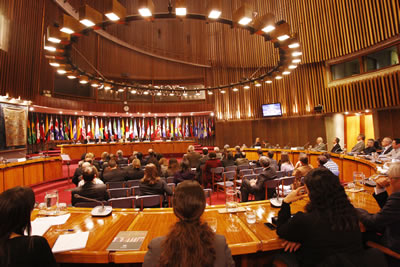ECLAC Proposes Initiatives to Renew Partnership between the European Union and Latin America and the Caribbean
Topic(s)
Executive Secretary, Alicia Bárcena, and former European Commissioner for External Relations and European Neighbourhood Policy, Benita Ferrero-Waldner, took part in the seminar.

(27 April 2011) Today, the Economic Commission for Latin America and the Caribbean (ECLAC) presented a new publication that analyses relations between Latin America and the Caribbean and the European Union in the areas of trade, investment and cooperation, and puts forward proposals for boosting these ties.
The document In search of a renewed partnership between Latin America and the Caribbean and the European Union, was presented at a round table discussion on the relations between Latin America and the Caribbean and the European Union, organized by ECLAC and the Chilean Ministry of Foreign Affairs.
This meeting is part of the preparations for the seventh Latin America, the Caribbean and the European Union Summit (LAC-EU), which will be held in Santiago in May 2012.
As she welcomed participants, ECLAC Executive Secretary, Alicia Bárcena, pointed out that there was now a unique opportunity to strengthen ties between the two regions.
"Latin America is being seen with new eyes by the entire world, and several regions and countries are now seeking partnerships with our continent. We have a unique opportunity to devise a medium-term strategy with the European Union that will forge a strategic relationship", she declared.
"Together we can move towards a more comprehensive public and private partnership, in which governments and businesses come together around common goals", she explained.
The main speaker at the meeting was Benita Ferrero-Waldner, former European Commissioner for External Relations and European Neighbourhood Policy, who referred to the reasons why Latin America and the Caribbean should interest Europeans more, and why the European Union must capture the attention of Latin Americans.
"I am convinced that this is the decade of Latin America. Right now, the possibilities for integration are huge, but we must make progress in achieving more quality education, scientific collaboration, innovation, technological development and partnerships between European and Latin American small and medium-sized enterprises to protect ourselves better from external shocks", she underlined.
According to the document presented by ECLAC, the European Union has lost some of its standing as a trading partner of the region. Although the EU remains the region's second trading partner, behind the United States, it will probably be overtaken by China in around 2014-2015. However, over the last decade the European Union has been the main source of foreign direct investment for the region. The region also benefits from a wide range of cooperation activities from the EU.
For ECLAC, strengthening bilateral relations would help to tackle major challenges, such as the persistently wide gaps that remain in terms of poverty, inequality, technology and innovation. In these areas, the European Union offers significant opportunities to foster public-private cooperation networks with businesses and governments in the region.
For the European Union, two key challenges are the search for new sources of economic growth and the supply of natural resources. Latin America and the Caribbean offers many opportunities in both areas, according to the ECLAC report, which also puts forward policy recommendations in the areas of trade and cooperation.
Any queries should be addressed to the ECLAC Public Information and Web Services Section.
E-mail: dpisantiago@cepal.org; telephone: (56 2) 210 2040.
Follow us on: Twitter, Facebook, Flickr and YouTube.
Related content
Apertura de la Mesa redonda sobre las relaciones de América Latina y el Caribe con la Unión Europea
Por Alicia Bárcena, Secretaria Ejecutiva de la CEPAL

ECLAC Calls for a Deeper Strategic Partnership between Europe and Latin America and the Caribbean
Alicia Bárcena was speaking at the Euro-Latin American Parliamentary Assembly (EuroLat) and taking part in the celebrations to mark the bicentenary of Uruguay.
Country(ies)
- European Union
Contact
Public Information Unit
- prensa@cepal.org
- (56 2) 2210 2040